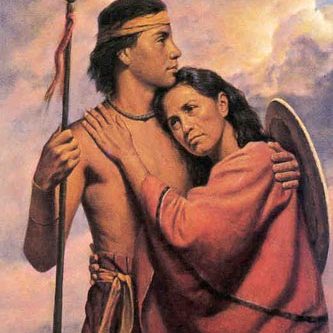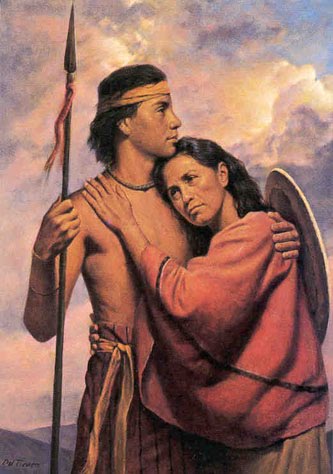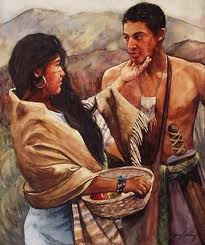Background: abt. 76-63 BC
The sons of Mosiah taught and converted the father of King Lamoni who then taught the gospel to his people. All of the Lamanties in the cities of Ishmael, Middoni, Nephi, Shilom, Shemlon. Lemuel, and Shimnilom accepted the gospel and repented of their sins. In fact, they covenanted to never again shed blood. They called themselves the people of Anti-Nephi-Lehi. Not long after they made this covenant the Amalekites and other Lamanites make preparations to attack them. When the people of Anti-Nephi-Lehi saw this they decided to bury their weapons of war so that would not be tempted to break the covenant they had made to God. When the Amalekites attacked, the people of Anti-Nephi-Lehi laid down and refused to fight, and 1,005 of them were slain. Many of the Lamanites were touched by this and refused to continue fighting; more than 1,000 Lamanites also made a covenant never to fight again.
In Alma 27 the people of Anti-Nephi-Lehi get attacked again and this time fled to the land of Zarahemla. The Nephites gave them the Land of Jershon and vowed to protect them. They were then called the people of Ammon. Eleven years later the Nephites were under attack from the Lamanites and the people of Ammon wanted to help, but didn’t want to break the covenant they had made to God. Their sons, who had not taken the vow, volunteered to fight instead. Under the command of the prophet Helaman, 2060 of them, referred to as the stripling warriors, went into battle. They were young, inexperienced, and fought in several dangerous battles. Miraculously not one of the stripling warriors died in battle. The prophet attributed this miracle to the faith, teachings, and examples of their mothers.
Facts about them:
- They were Lamanites who accepted the gospel when taught by the sons of Mosiah;
- After repenting of their sins they made a covenant to God that they would never again shed blood. They were afraid that if they did they would never be forgiven by God again;
- They didn’t bury their weapons, only set them aside, until they saw for certain they were going to be attacked. It was only when the Lamanites were upon them that they buried the weapons and accepted death rather than break their covenant;
- They were mothers;
- Their sons would have witnessed a great deal of bloodshed and death at a very young age;
- They were refugees;
- 11 years after they settled in Jershon they sent their young sons into battle against the Lamanites, led by a prophet of God;
- They had no fear of death because they understood the power of the atonement of Jesus Christ;
- They had strong faith and they taught it to their sons.
Speculations about them:
- Some of them were probably widows who had lost their husbands in the attacks by the Amalekites (Alma 27:25026);
- Maybe some of the sons would have lost their mothers during the Lamanite attacks;
- They wouldn’t have had much contact with their sons while they were at war. The only thing they could have done for them was to pray that God would protect them;
- The stripling warriors were kept safe, not only because of their faith, but also because of the prayers of their mothers.
My Thoughts:
They did not fear death because they had a perfect understanding of the atonement
Alma 27:28 explains the foundation of these women’s faith. It explains why they could watch thousands of their brothers and sisters be ruthlessly slaughtered, why they were able to leave their homeland, why they were willing to die rather than break their covenants, and why they were willing to send their young sons into battle. It says:
“And they did look upon shedding the blood of their brethren with greatest abhorrence; and they never could be prevailed upon to take up arms against their brethren; and they never did look upon death with an degree of terror, for their hope and views of Christ and the resurrection; therefore, death was swallowed up to them by the victory of Christ over it.”
This is what these mothers knew, and this is what they taught their sons. They knew that because of the atonement of Jesus Christ death had no power. They had no fear of physical death because Jesus would conquer it, and therefore it had “no sting”. They knew that the only thing to fear, and what would bring death, was sin and the breaking of covenants. They knew that if they honored their covenants and followed the Lord Jesus Christ, man could do nothing to them. They understood that mortal life was just a short part of their eternal existence. They had their eyes on an eternal , not an earthly, reward.
Their sons did not fear death because their mothers did not fear death. Their mothers had taught hem, by their own example of being willing to die rather than break covenants, the power of the atonement. These sons went forth with a perfect understanding that physical death is temporary, and that if the were faithful and observed ” to perform every word with exactness” they would live again. They did not doubt that God was with them. What a beautiful heritage these mothers were able to pass on to their sons! This is a heritage that EVERY faithful woman of God should strive to give to her children. I really like this talk about motherhood by Elder Holland of the Quorum of the Twelve Apostles. In it he says:
“Yours is the grand tradition of Eve, the mother of all the human family, the one who understood that she and Adam had to fall in order that “men [and women] might be” and that there would be joy. Yours is the grand tradition of Sarah and Rebekah and Rachel, without whom there could not have been those magnificent patriarchal promises to Abraham, Isaac and Jacob which bless us all. Yours in the grand tradition of Lois and Eunice and the mothers of the 2,000 stripling warriors. Yours is the grand tradition of Mary, chosen and foreordained from before this world was, to conceive, carry, and bear the Son of God Himself. We thank all of you, including our own mothers, and tell you there is nothing more important in the world that participating so directly in the work of God, in bringing to pass the morality and earthly life of His daughters and sons, so that immortality and eternal life can come in those celestial realms on high.”
What we can learn from them:
- Even though women may not appear to be in the forefront of stories, what they do and how they teach their children have far reaching affects on politics, history, and society;
- Women can bring to pass miracles when they understand the atonement and follow, with exactness, the principles of the gospel;
- God hears the prayers of mothers and answers them in miraculous ways;
- When we have a clear understanding of the atonement we do not have to fear death;
- Even children who are traumatized by bloodshed and war can be taught forgiveness, love and peace through the teachings of Jesus Christ.
Questions:
- What type of faith would it take to refuse to fight and instead watch those around you die? Could you do it?
- How are you teaching your children (or children around you) about the power of the atonement?
- If you have made sacred covenants to God, are you willing to die for them rather than break them?
- Can you think of times your mother prayed for you and how your life was influenced because of it?
- How can we help children who have been traumatized by war learn peace?
- Do you practice what you preach?







Julie Beck also gave a talk entitled “Mothers Who Know” that was inspired by the mothers of these warriors. There is so much to learn from these great women!
I just found your blog and want to thank you for taking the time to post about your experiences. At Women's Conference this year there was at talk about women in the scriptures. I have since started my journey into learning about the women in the scritpures. I'm excited for what I'll learn.
Thank you so much for your beautiful insights. I've been studying about these mothers in the scriptures, and your comments are very touching and powerful. Thank you!
Thank you so much for your comments. They are so touching and insightful.